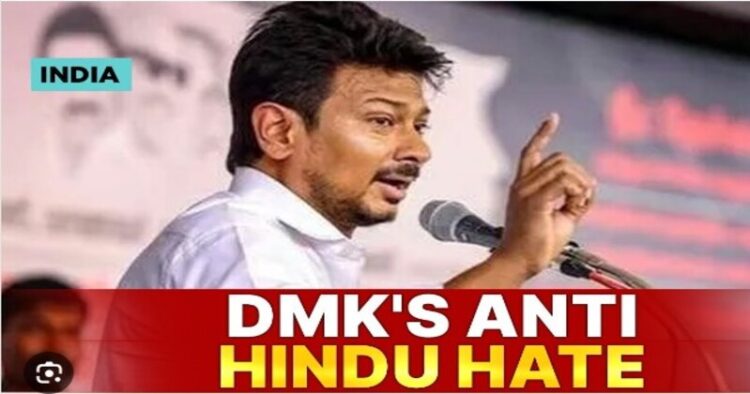With the announcement of the poll schedule for the 2024 Lok Sabha elections by the Election Commission, political fervour has intensified across the nation. Political parties, anticipating the polls well in advance, have already begun forming alliances to maximise their seat share. The opposition, comprising diverse ideological groups, has united under a single agenda: to dislodge the Modi-led NDA government at the Centre.
However, the Modi parivar appears confident in securing a third consecutive term, rallying supporters with the slogan “Again Modi, we want Modi.” Their ambitious target of securing 400 plus seats reflects their determination to continue the reforms initiated over the past decade and propel India towards superpower status in the years to come.
In Tamil Nadu, a strong wave of anti-establishment sentiment is brewing against the incumbent DMK and its allies. This sentiment has been fueled by the party’s perceived anti-Hindu stance, repeated instances of minority appeasement, failure to fulfill promises made during the 2021 assembly polls, and the escalating prices of essential commodities.
Similar to the events of 2021, there is a widespread circulation of handbills urging voters not to support the DMK due to its stance on eradicating Sanatana Dharma. The recent controversial remarks made by Udhaya Nidhi Stalin, advocating for the eradication of Sanatana Dharma, have only added fuel to the fire and garnered national condemnation.
The AIADMK, which withdrew from the NDA alliance last August, has also joined the chorus against the DMK. In a tweet, the party urged voters to “say no to DMK and drugs,” hinting at allegations of drug-related issues within the DMK ranks. However, the AIADMK’s stance has drawn criticism for its perceived pandering to minorities and its claims that the BJP has suppressed their rights. Additionally, party leader Udhaya Nidhi Stalin’s decision to cease sporting sacred ash and kumkum on his face following the split from the NDA has raised eyebrows among voters.
திமுக : இந்து விரோத கட்சி
அதிமுக : மதநல்லிணக்க அரசு. pic.twitter.com/9juNJVJI5g
— AIADMK – Say No To Drugs & DMK (@AIADMKOfficial) March 3, 2021
The political landscape in Tamil Nadu has been stirred once again as posters and handbills expressing sentiments against the ruling DMK party and its allies have started appearing across the state. These posters, prominently displayed on the doors of residences, carry strong messages urging voters not to support parties that allegedly mock Hindu spiritual beliefs, customs, and rituals.
In a flashback to the 2021 elections, similar posters and handbills had made rounds, bearing the caption “Election Pledge 2021.” These materials conveyed a solemn vow by individuals and their families to refrain from voting for the DMK and its allies, citing their perceived disrespect towards Hindu traditions. This sentiment has now resurfaced, indicating persistent dissatisfaction among certain segments of the electorate.
However, amidst these developments, the spotlight has shifted to the stance of the de-notified tribes (DNT) community, comprising over 1.5 crore members in Tamil Nadu. This community, which consists of 68 different castes, including Piramalai Kallar, Maravar, Thottaiya Naicker, Orrali Goundar, Vettuva Goundar, Boyar, Muthraiyar, and others, holds significant electoral influence.
The DNT community’s discontentment with the ruling DMK government has raised questions about their voting preferences in the upcoming elections. Their dissatisfaction stems from the historical issue of community identity and government recognition. In 1978, during MG Ramachandran’s tenure as Chief Minister, the government issued a controversial Government Order (GO) announcing the replacement of DNT community certificates with TNC community certificates for 69 communities. This decision was met with shock and dismay by the DNT community, as they felt their tribal identity was being disregarded.
Subsequently, in 1980, the AIADMK government revoked the GO, but concerns persisted. The matter resurfaced in 2019 when the AIADMK government issued another GO, stating that all 68 communities within the DNT category would receive community certificates to avail benefits from Central and state government schemes.
In the run-up to the 2021 assembly polls in Tamil Nadu, DMK President M K Stalin had made promises to the de-notified tribes (DNT) community, assuring them of measures to address their grievances and eradicate casteism. However, nearly a year after assuming power, these assurances remain unfulfilled, leading to disillusionment among the DNT community.
Stalin had pledged to cancel the dual community certificate system and establish a welfare board or commission for the DNT community upon coming to power. Additionally, the Central government had announced plans for a census of the community’s social and economic details in 2020, with the expectation that the then Chief Minister, Edapadi K Palaniswamy, would appoint a nodal officer to oversee the task. However, this responsibility was not fulfilled, prompting criticism from Stalin, who vowed to rectify the lapse by appointing a dedicated nodal officer. Despite these assurances, tangible action on the ground remains elusive.
The failure of both Dravidian parties to address the concerns of the DNT community has led to widespread discontent among its members, numbering over 1.5 crore. In response, the community has decided to launch a campaign against the DMK and its allies beginning on the 17th of this month. This development raises questions about where their votes will ultimately go in the upcoming elections.
Speaking to the media, Ramaswamy, state coordinator of the Social Justice Federation, declared that the DNT community would not support either the AIADMK or the DMK. He announced plans for a campaign against these parties and expressed openness to extending support to the BJP in the upcoming Lok Sabha elections.
Similarly, traders’ outfits in the state have turned against the DMK, citing unfulfilled promises made during the 2021 assembly polls. These assurances included pledges to slash taxes levied at the local level and calculate electricity and power consumption on a weekly basis. However, traders feel that the recent state budget did not offer significant support for them, and the government has failed to address their concerns seriously.


















Comments